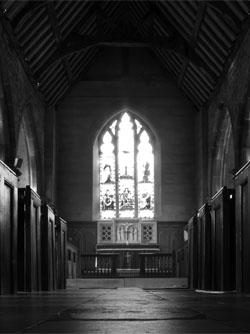The Truth About Hell
Are billions burning forever in eternal torment because they were born in the wrong place or time? Yes, there is a hell—and hellfire—but the truth is not what most imagine!
Who is in hell right now? Your unconverted relatives?
People who never heard of Jesus Christ? Your Bible explains the truth
about the afterlife, and what really happens when you die!
As a minister officiating at funerals over the years, I have seen many widows, widowers and other surviving family members comforted by the truths of their Bible—they know God's word promises that their loved ones will be resurrected from the dead. On the other hand, I have witnessed the mental anguish of those who assume that an "unsaved" family member or friend is experiencing eternal torment in hell.
In 2007, the Gallup Organization released its "Values and Beliefs" poll, revealing that 81 percent of Americans believe in a heaven, and 69 percent believe in a hell. But beliefs about heaven and hell vary widely. Some get their idea of heaven and hell from works of fiction like the medieval Italian poet Dante's Divine Comedy, while others look to scientific studies of "near death experiences" for clues about what happens after death.
Tomorrow's World readers know that we look to God's word for the answers to life's most basic questions. What does your Bible say about heaven and hell, and about the future hope of those who have died? The good news is that the truth of Scripture can give hope to those who have been deceived by false information about heaven and hell.
Asleep Until the Resurrection
Under questioning by the Sanhedrin, the Apostle Paul explained his most cherished beliefs. Defending the very basis of his hope for life beyond death, he made the resurrection the central issue: "But when Paul perceived that one part were Sadducees and the other Pharisees, he cried out in the council, 'Men and brethren, I am a Pharisee, the son of a Pharisee; concerning the hope and resurrection of the dead I am being judged!'" (Acts 23:6).
Was Paul saying that he would go to heaven when he died? No! Paul was looking forward to the resurrection from the dead at the return of Jesus Christ! Paul wrote of his faith in Christ and his future goal of the resurrection, "that I may know Him and the power of His resurrection, and the fellowship of His sufferings, being conformed to His death, if, by any means, I may attain to the resurrection from the dead" (Philippians 3:10–11).
As shocking as it may sound to those who have absorbed the world's conventional understanding, the Bible teaches that when people die, they remain dead until the resurrection. The resurrection is the hope of true Christians! The Apostle Paul wanted us to know the truth about the resurrection. He wrote: "But I do not want you to be ignorant, brethren, concerning those who have fallen asleep, lest you sorrow as others who have no hope. For if we believe that Jesus died and rose again, even so God will bring with Him those who sleep in Jesus. For this we say to you by the word of the Lord, that we who are alive and remain until the coming of the Lord will by no means precede those who are asleep" (1 Thessalonians 4:13–15).
Paul used sleep as a metaphor for death. "But surely," you may be thinking, "there must be some sinners right now being tormented in eternal hellfire?" The Bible's answer, you may be surprised to discover, is: Absolutely not!
Yes, as we will see later, Scripture explains that incorrigibly wicked sinners will be thrown into a lake of fire after the White Throne Judgment (Revelation 20:14–15; 21:8). Your Bible calls this eternal punishment (not eternal punish-ing) the "second death"—the final death from which there is no future resurrection. But who goes to that eternal punishment, and when? As we will see later in this article, no one has yet experienced this punishment—and it may apply to fewer people than you expect!
Notice that the Apostle Paul does not describe dead Christians as being active or alive in heaven. They are asleep—dead—until they are resurrected at Christ's second coming. Paul went on to write: "For the Lord Himself will descend from heaven with a shout, with the voice of an archangel, and with the trumpet of God. And the dead in Christ will rise first. Then we who are alive and remain shall be caught up together with them in the clouds to meet the Lord in the air. And thus we shall always be with the Lord. Therefore comfort one another with these words" (1 Thessalonians 4:16–18).
Notice that this resurrection takes place "with the trumpet" of God. That is the last trumpet, the seventh trumpet described in the book of Revelation (1 Corinthians 15:52; Revelation 11:15). Notice, too, that "the dead in Christ will rise first." True Christians who have died will not be resurrected until Christ returns! Those of us who are alive when Christ returns will join those saints who have died in the faith. They will be resurrected to receive the promised gift of eternal life! That is what all genuine Christians today look forward to—the resurrection to immortality at Jesus Christ's return!
Yes, Scripture contains many references to individual resurrections from death to physical life, as when Jesus raised Lazarus from the dead (John 11:43). But the resurrection for which Christians hope is the resurrection to immortality—the first of three "general" resurrections described in your Bible.
Who Is in Heaven?
Where will Christians go when they are resurrected? Will they spend eternity in heaven? To begin to answer that question, we should ask: "Who is in heaven now?" What about the heroes of faith mentioned in Hebrews 11, often called the "faith chapter" of your Bible? Certainly, if any of them are in heaven, King David (whom God called a man after His own heart in Acts 13:22), must be—but what does your Bible say?
On the Day of Pentecost in 31ad, the Apostle Peter preached to a large crowd. Telling them of the Messiah's resurrection from the dead, he explained: "Men and brethren, let me speak freely to you of the patriarch David, that he is both dead and buried, and his tomb is with us to this day" (Acts 2:29). And, making it even more clear: "For David did not ascend into the heavens" (v. 34).
Jesus Himself made this point plainly, stating: "No one has ascended to heaven but He who came down from heaven" (John 3:13). The Apostle John recorded this statement about 60 years after Jesus' death and resurrection, so he added a parenthetical statement about His Savior: "that is, the Son of Man who is in heaven." John's statement affirms that when he wrote his Gospel in the mid-90s ad, only Jesus Christ had ascended to heaven!
Scripture reveals that the saints will inherit the earth and "all things"—the universe (Revelation 21:7; Romans 8:32)! But that inheritance will not be given until the resurrection! The Bible clearly shows that the dead remain dead until the resurrection. The idea that people at death go immediately to heaven or hell is based on the pagan doctrine of the immortal soul, which is not in your Bible, but which entered professing Christianity as it expanded throughout the Roman Empire and many former pagans brought their old doctrines into their new churches!
We need to understand that we were not born with immortality. It is a gift from God! Remember, "For the wages of sin is death; but the gift of God is eternal life through Jesus Christ our Lord" (Romans 6:23, KJV). Notice that the scripture does not state, "The wages of sin is immortal life in hell-fire." The wages of sin is not immortal life; it is death—the absence of life. If you already have an immortal soul, if you already have eternal life, then you do not need it as a gift from God. Yes, a soul can die! The prophet Ezekiel reminds us, "The soul who sins shall die!" (Ezekiel 18:4).
The Hebrew word for "soul" is nephesh, which means physical or natural life. In Genesis 1, the same word nephesh also refers to every "living thing"—to all animal life, including mammals, fish and birds. The Bible does teach that there is a human spirit, the spirit in man (1 Corinthians 2:11; Job 32:8, 18). But that human spirit is not an immortal soul.
Is the soul immortal? Jesus warned us: "And do not fear those who kill the body but cannot kill the soul. But rather fear Him who is able to destroy both soul and body in hell" (Matthew 10:28). Yes, if you believe your Bible, you must admit, God has the power to destroy the soul!
What Hell Are You Talking About?
Perhaps the most common concept of hell in the Western nations today comes from the famous Italian poet Dante Alighieri, who wrote his Divina Commmedia or Divine Comedy, consisting of three parts: Paradiso, Purgatorio and Inferno, or Paradise, Purgatory and Hell.
In Dante's Inferno, the poet Virgil guides Dante on a mythical journey through hell. At Hell's entrance is a foreboding sign, with the words: "Abandon All Hope, You Who Enter Here." Virgil tells Dante what he can expect on his journey. "I'll be your guide, and you will follow me, and I will lead you through a world of pain where dead souls writhe in endless agony and clamor, as they cry, to die again" (Canto I, p. 24).
Many will be shocked to learn that this vivid imagery does not come from your Bible! The Hell of Scripture is not what Dante portrayed! But if that is true, what and where is Hell? The above-mentioned Matthew 10 reference gives us part of the answer. The word Jesus used for "hell" in Matthew 10:28 was "Gehenna"—a term for the Valley of Hinnom, the burning refuse dump just outside Jerusalem, where trash was burned up and destroyed. In one sense, then, "hell" is the Valley of Hinnom. But the very word "hell" can be misleading, since there are four different words—three in Greek and one in Hebrew—translated as "hell" in your English-language Bible. Each of those words has a different meaning.
In the King James Version and New King James Version, the Hebrew word often translated as "hell" is sheol—which simply means "pit" or "grave." It does not mean a place of ever-burning fire! That word sheol occurs 65 times in the Old Testament, yet in the King James Version it is only translated as "hell" 31 times! It is translated as "grave" another 31 times, and as "pit" three times. If you read the New International Version, you will see that it never translates sheol as "hell"—it simply uses the biblically and linguistically accurate term "grave." By its very definition, we can understand that no one is burning in sheol!
Along with Gehenna, which describes the fire that will destroy the souls of the wicked (Matthew 10:28), your New Testament includes two other Greek words that are translated as "hell." The Greek word Hades, like the Hebrew sheol, simply means "pit" or "grave." If you read the New King James Version you will notice that Hades is often left untranslated.
The fourth biblical word translated as "hell" is the Greek word Tartarus. This word denotes a condition of restraint, and your Bible shows that it applies to fallen angels, not to sinful human beings. Notice: "God did not spare the angels who sinned, but cast them down to hell [Tartarus] and delivered them into chains of darkness, to be reserved for judgment" (2 Peter 2:4).
So, as you can see, using the English word "hell" for all four words, with their three distinct meanings, does not accurately communicate the truth of your Bible. When someone asks you about hell, you should ask them to clarify: "What 'hell' are you talking about?"
Still, you may wonder: "Who goes to hell?" Is God unfair? We know that the name of Jesus Christ is the only name by which anyone can be saved (Acts 4:12). So, does this mean that those who never heard the name of Jesus Christ will be condemned to eternal hell through no fault of their own? Or does God have two unequal standards for people, depending on whether or not they heard Jesus' name?
The answer may surprise you, and it should give you hope. God will give every human being an opportunity to hear the true Gospel. If they respond, accept Jesus Christ's sacrifice, and obey His commandments with the help of the Holy Spirit, they will be saved. "But what about the billions who have lived and died without hearing the Gospel?" The answer is found in the book of Revelation, which describes a future time known as the White Throne Judgment.
The "Books" Will Be Opened
Today's Christians who die in the faith, or who are alive at Jesus Christ's second coming, will be part of the "first resurrection" and will assist their Savior and King as He rules during the soon-coming Millennium on the earth. But if there is a "first resurrection" (Revelation 20:5) there must also be a second resurrection. That second resurrection is the White Throne Judgment. Here is its biblical description: "Then I saw a great white throne and Him who sat on it, from whose face the earth and the heaven fled away. And there was found no place for them. And I saw the dead, small and great, standing before God, and books were opened. And another book was opened, which is the Book of Life. And the dead were judged according to their works, by the things which were written in the books" (Revelation 20:11–12).
The Greek word for "books" is biblia. Yes, after the second resurrection, the "books"—the Bible—will for the very first time be opened to the understanding of the billions of human beings who lived and died before the Millennium without hearing the true Gospel of Jesus Christ. Billions will have their first opportunity to learn the truth—and they will have one particular benefit we do not have today, since they will be able to see the consequences of mankind living its own way in this present age, and compare it against the reality of the Millennial world ruled by Jesus Christ. This is not a "second chance" for these people; it will be their one opportunity to understand the truth, repent of their sins and accept Jesus Christ as their Savior.
Sadly, even in the White Throne Judgment, some will reject God's grace and salvation. They will refuse to repent of their sins and will reject Jesus Christ's sacrifice. God will not force these rebellious people to obey Him. He will destroy them in the lake of fire. Finally, those who lived and died knowing the truth, and who rejected it, will be raised for the third resurrection—the resurrection to eternal punishment through death (not eternal life) in the lake of fire (John 5:29). Yes, God is just. He reminds us, "'Vengeance is Mine, I will repay,' says the Lord" (Hebrews 10:30). Standing before the lake of fire, the wicked will be tormented, then they will be cast into the lake and burned up forever (Revelation 21:8). Never again will they live. "For the wages of sin is death [eternal death], but the gift of God is eternal life in Christ Jesus our Lord" (Romans 6:23).
Those whom God is calling today have the awesome opportunity to become part of His Family at the first resurrection. But no one needs to fear that others are being denied their own opportunity for salvation. If God has not opened the minds of your friends and loved ones, they will have their opportunity when God wills it. But if God is opening your mind, you need to act now and receive the amazing reward He has prepared for you!






